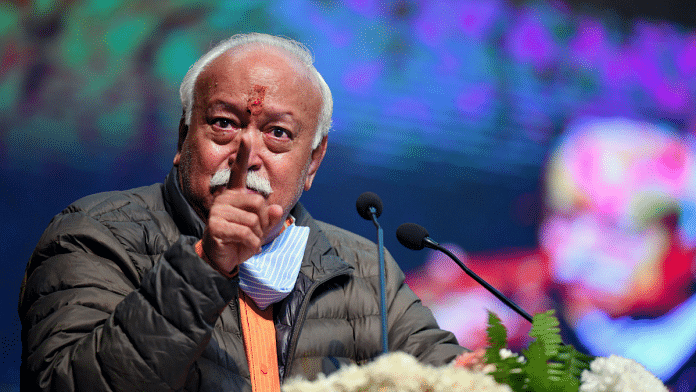The discussion over ‘Muslim supremacy’ mindset in India is not new. If we carefully examine the past, we will find that the two-nation theory is nothing but a Muslim supremacist idea coined by elite Muslims — Ashraafs, the dominant Muslim class/caste — for protecting their self-interest.
According to the two-nation theory, Muslims and Hindus cannot live together but the reality is that it was the Muslim elites who did not want to be governed by non-Muslims or share power with them in a secular democratic setup, hence the creation of Pakistan.
This century-old debate again gained centre stage in the political discourse of the country when the head of the Rashtriya Swayamsevak Sangh (RSS), Mohan Bhagwat gave an interview to the RSS mouthpieces Organiser and Panchjanya on 11 January. He said, “The simple truth is this – Hindustan should remain Hindustan. There is no harm to Muslims living today in Bharat. If they wish to stick to their faith, they can. If they want to return to the faith of their ancestors, they may. It is entirely their choice. There is no such stubbornness among Hindus. Islam has nothing to fear. But at the same time, Muslims must abandon their boisterous rhetoric of supremacy, ‘Muslim supremacy’.”
What’s worrisome is that no thinker wants to discuss such a statement/sentiment with sincerity and honesty but only with an agenda. There is a side in this ongoing ideological battle that will read between the lines and create a narrative of hostility towards all Indian Muslims. And then a section from the other side will do exactly the same.
Also Read: BBC Modi documentary row highlights highly risky nature of India’s new image wars
The status quo remains
My problem is that these extremely polarised narrative wars will never allow an honest intellectual discussion around such sensitive matters, discussions that will actually help everyone, including Indian Muslims.
But before going into any discussion, we should examine Bhagwat’s statement—what message he is trying to convey here? There can be many interpretations, what does the ‘but’ that comes after the statement ‘Islam has nothing to fear’ mean? Does that mean conditions apply for Muslims to remain safe in India? Or it is a simple positive statement with a message of assimilation?
If we see the statement through a political lens, there are two meanings, either Bhagwat is talking about the mindset of supremacy or the theological aspect of Islam.
When we look at the Muslim supremacy mindset of the dominant class, we must acknowledge that influential positions in both the intellectual and political space had only been assigned to Ashraafs pre-Partition. Truth be told, even after Partition, the status quo remains. All in the name of Muslim rights or Muslim representation.
Around 80 per cent of Indian Muslims (Pasmandas, the oppressed Muslim class/caste) have nothing to do with this ruling/supremacy mindset, they were never rulers, they have never shared any kind of power or position to influence any policies. Even most religious leadership comes from the Ashraaf community, which has made sure to keep the Pasmanda Muslims in the same, backward, condition even after Independence.
Having said that, generalising that Ashraaf Muslims today subscribe to such a mindset would be libelous. But there are people today who still live in the glory of the past and from time to time give statements that reflect this ideology. The irony is that they don’t shy away from taking pride in an ‘invader’ ruling India but in the same breath complain about ‘majoritarianism’.
Also Read: Why Muslims must consider the rainbow BJP is making. Identity matters in a democracy
Narrative of victimhood must be abandoned
Religious supremacy, be it Hindu or Muslim, only deepens the already-existing fault line. The only difference is that we discuss the latter at length and voices within the majority battle against it. What we don’t want to accept is that such an idea also exists in Muslim society, and voices from within condemning it is a far cry.
This does a disservice not only to the nation but also to Muslim society, poisoning the community’s youth. The dominant class adheres to the idea that they once ruled India, and end up seeing themselves as victims of a system which snatched away their status as rulers instead of seeing themselves as part of a nation and equal to every other citizen. Such a dose of manufactured and misplaced victimhood only pushes most of us, Pasmanda Muslims, into ghettos, fills us with suspicion towards the majority and stops our mainstreaming.
All India Majlis-e-Ittehadul Muslimeen president and MP Asaduddin Owaisi ’s response to Bhagwat’s interview—who is Mohan Bhagwat to give Muslims permission to live in India?—precisely highlights the problem. That instead of having the willingness to start a dialogue between two communities, Muslim elites are more focused on creating a narrative of victimhood by spreading the message that they all are under attack.
Muslim supremacy is not a bogey raised by Mohan Bhagwat. But an ordinary Indian Muslim doesn’t pose any threat to the nation and doesn’t have the power or ability to shape policies. Especially because Muslims are a minority, constituting only 15 per cent of the country’s population.
So while it is important to discuss the supremacist attitude of some elites within the Muslim fold so that a long-term solution is found to bridge the gap between the two communities, Bhagwat’s statement should not have used the word ‘Muslim’ as it implies that every member of the community is accountable.
Muslim youths who will shape our future should be made aware of the existence of a supremacist mindset within the community and why they should abandon this boisterous rhetoric. Additionally, Owaisi’s confrontational attitude only harms the communal harmony of Bharat, he cannot play bully while pretending to be a victim.
Amana Begam Ansari is a columnist, writer, TV News Panelist. She also runs a weekly Youtube show called ‘India this Week by Amana and Khalid’. Views are personal.
(Edited by Theres Sudeep)



